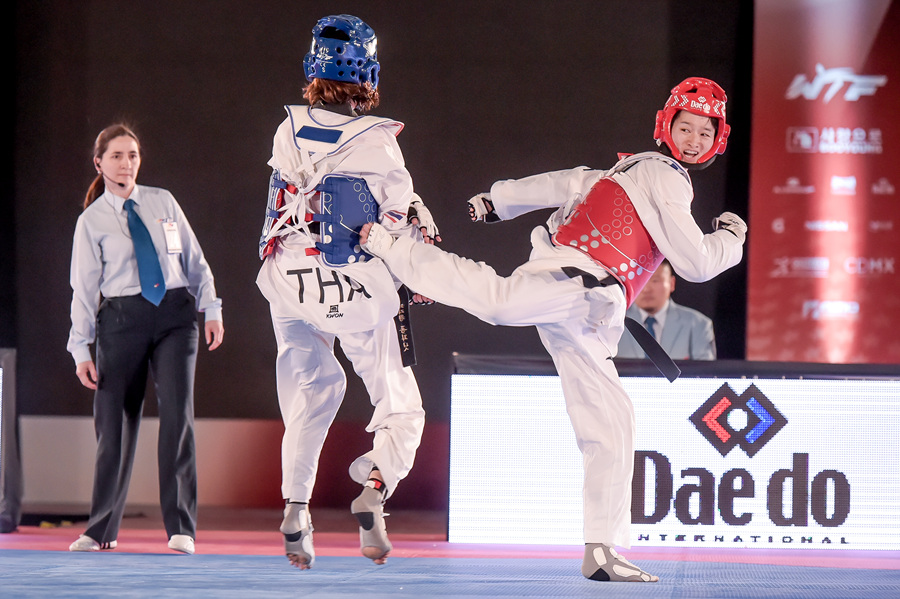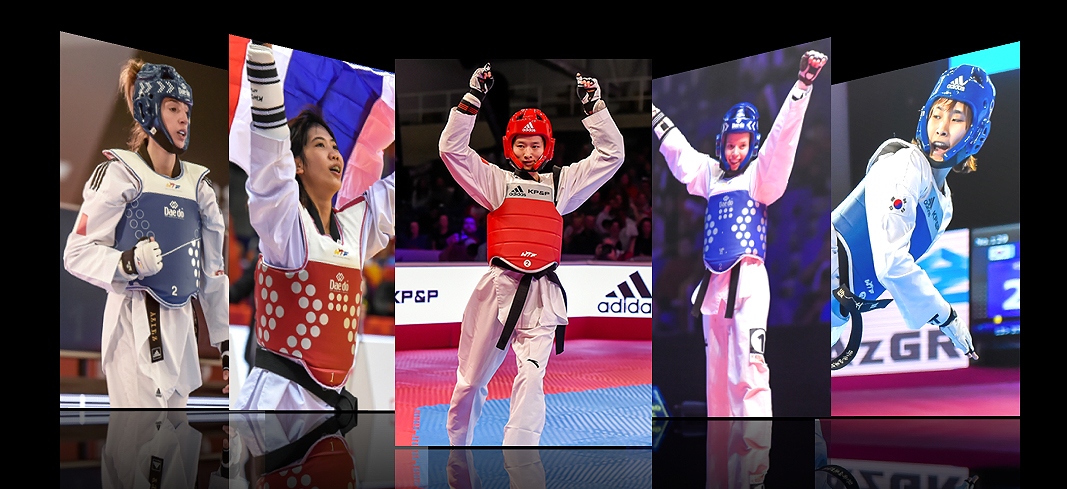April 28, 2016 - Bestriding the lightest of the female weight categories like a mini-colossus is Chinese sensation Jingyu “Superkicker” Wu. Arguably the most dominant player in taekwondo, male or female, Wu already has two Olympic gold medals under her black belt and will be seeking a third in Rio. If she wins that, it will be historic: Three Olympic golds is a feat that no taekwondo fighter has so far achieved.
But there is no sure thing in any sport, and she will be facing a steep challenge from four fighters who will have analyzed every inch of her world-beating game: Thailand’s Panipak Wongpattanakit, Croatia’s Lucija Zaninovic, South Korea’s So-hui Kim and France’s Yasmina Aziez.
Even so, few taekwondo fans worldwide would bet against Wu. In addition to her Beijing 2008 and London 2012 Olympic victories, the diminutive Chinese, (who has adopted the English name “Joy” - a translation of her Chinese name) also won the 2007 and 2011 World Taekwondo Championships. She has competed in a total of 29 international competitions, garnering a staggering 90 percent win ratio. This means the big question hanging over this weight category is pretty simple:
Wu or not Wu?

The Chinese fighter utterly dominated 2015 World Taekwondo Grand Prix (GP) series. Having skipped the first event in Moscow, she started her winning run at the Samsun GP Series 2 in Turkey, routing Aziez in the semifinals, 17-0, so winning by 12-point gap. (In taekwondo, if a fighter seizes a 12-lead, the match is halted.) In the finals, she beat Wongpattanakit 24-12 – another point gap win. It is extraordinary for any athlete to win with 12-point gaps at this level of competition, and this shows Wu’s quality. There was more to come. In the Manchester GP Series 3, she won the gold medal after winning every single match by point gap. And at the GP Final in Mexico City, she defeated Aziez again in the final, seizing the number one ranking position in the category from Zaninovic.
Wu delights spectators with the versatility of her repertoire. Her game management is textbook. In the first round, she reads her opponent’s game – footwork, kicks and defensive movement. In the second, she takes the fight to her opponent using her trademark style: She has excellent upper body balance allowing her to wield the crowd-pleasing ax kick to the opponent’s head; she also likes the spinning back kick. She uses both arms to feint, maintains equilibrium and mounts a defense that is as impenetrable as the Great Wall.
What, then, of her competitors?
Wongpattanakit took the number one spot at the 2015 World Championships in Chelyabinsk, Russia – albeit fighting in a different weight category to Wu – and was seen as a rising star. At the Samsun GP Series 2, she lost against Wu by point gap - but was the only player able to land a head kick against the Chinese sensation. In the final series in Mexico City, she fought Wu in the semifinals, losing again, 15-3 -by point gap. She does, however, have one advantage: She is taller and has longer legs than Wu. If she and her coach can adjust her game to leverage her physical advantages to the max, she should be able to score to Wu’s head while keeping her own helmet kick-free.
Zaninovic is the 2012 European champion and in the 2014 GP series, won gold in Astana, bronze in Manchester and gold in Queretaro, Mexico. This roster of performances made her a stable number one in the category before Wu stormed into the Grand Prix Series 2 in 2015. The Croatian boasts great flexibility, excellent balance and plenty of experience. She will also be seeking to avenge her loss to Wu in the semifinals of the 2012 London Olympics.
Kim is highly competitive against Wu when it comes to technical capacity. In World Senior Championships she fights at -46kg, but in Olympic and GP competition (where the number of weight categories is reduced) she competes at -49kg. She won World Championships in 2011 and 2013, and took gold at the 2014 Asian Games. She won the silver medal in the 2013 Manchester GP Final and won bronze in the 2014 Suzhou GP Series 1 (having lost to Wu, 6-2). In the 2015 GP Series 1 in Moscow, she won gold – but during that tournament, Wu was not competing. Wu is slightly bigger and stronger; against those attributes, Kim will have to rely on her footwork and speed. But she remains the only athlete on the circuit who can fight Wu with a full arsenal of diverse techniques.

Aziez cannot be overlooked: The French athlete is always a potential contender. She won bronze in the 2013 Manchester GP, silver in the 2014 Suzhou GP Series 1 (losing to Wu, 4-0), bronze in the 2014 Manchester GP Series 3, bronze in the 2014 Queretaro GP final and bronze in the 2015 Samsun GP Series 2 (losing to Wu by a painful 17-0). Lastly, she won silver in the 2015 GP Final in Mexico City - where she fought Wu to a relatively close match, losing just two points down, 6-4. She has fought Wu three times and lost three times, but nearly always manages to make the medal tables.
Another fighter who merits mention is Brazil’s Iris Tang Sing, who automatically takes the number four seed in the category. Given the expected hometown support in Rio, she will be a force to reckon with.
How do the rivalries in this category stack up?
Zaninovic beat Wongpattanakit in 2014 Manchester GP Series 3, 7-3. She has no record of fighting Aziez or Kim. Wongpattanakit has lost once to Zaninovic and lost twice to Wu (both by point gap). She has lost to Kim once. Kim has fought Wu twice and lost twice. She has beaten Wongpattanakit once and has beaten Aziez once.




































